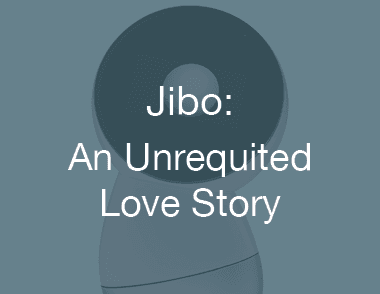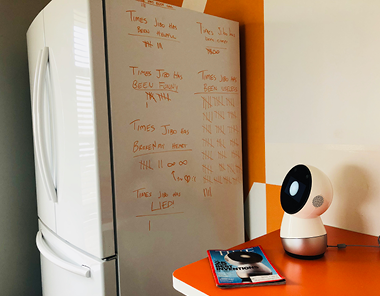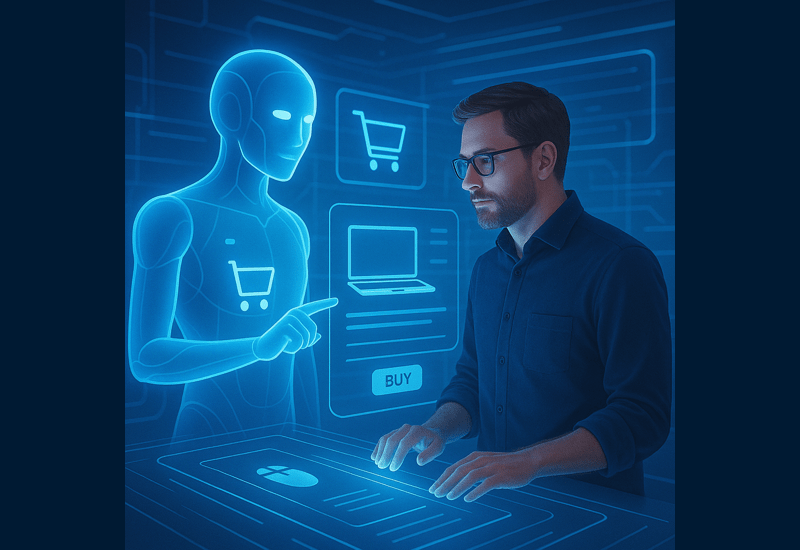 Jibo, recently named the 2017 Invention of The Year by Time Magazine, was largely designed by Cynthia Breazeal, a Roboticist and an Associate Professor at MIT. The friendly robot seemed like a brilliant idea: a cute, little buddy that could order pizza, take pictures at a birthday party, recognize its owner’s face and learn names. Jibo was even to involve itself in our day-to-day activities, to ask about our day and add “uh huh” and “really?” at well placed moments in conversation to appear engaged. What more could we need?
Jibo, recently named the 2017 Invention of The Year by Time Magazine, was largely designed by Cynthia Breazeal, a Roboticist and an Associate Professor at MIT. The friendly robot seemed like a brilliant idea: a cute, little buddy that could order pizza, take pictures at a birthday party, recognize its owner’s face and learn names. Jibo was even to involve itself in our day-to-day activities, to ask about our day and add “uh huh” and “really?” at well placed moments in conversation to appear engaged. What more could we need?
I was fascinated with Jibo. The invention was to be crowdfunded through an Indiegogo campaign at a time when crowdfunding was kind of new. And I loved the idea of crowdfunding. I had thought the days of garage tech were over and all major software and hardware advances were going to need to be completely driven by the big guns of tech like Google, Apple, Facebook and Microsoft – or at least their venture capitalist buddies from Silicon Valley. And then Jibo showed up and made me believe that something well-designed by a small, thoughtful team could muster the resources needed to compete through $500 – $1,000 micro investments. All they had to do was convince a bunch of nerds (like the Human Element team) to shell out some cash, and we’d be off to the future of human robotic interaction.
So we did it. We ordered one for $599 with the SDK, investing in the Jibo anomaly in August of 2014. As a small, successful organization, the Human Element team was more than elated to be a part of the Jibo trend. From the initial order email, his estimated delivery date was December 2015. The entire team waited in great anticipation for our wondrous addition’s arrival. From his big, beautiful blue eye to his approachable, rounded form, I knew that Jibo would be the coolest.
I waited. And waited. December 2015 came and went. And so did the following December. The heart can only take so much disappointment before distance has to be taken. And soon I found myself speaking less of Jibo, even forgetting about Jibo until I would get another periodic email informing me of the progress… and a further delay. Letter after letter of disappointment came. Jibo would be delayed and delayed… and delayed again.
By the time Jibo arrived two months ago, and we plugged him in, but it seemed that the world of technology advancements had already passed him by. Our team was shocked (and frankly, a little annoyed) by all the updates that needed to be installed just for our new treasure to function as advertised, And there was nothing he could do about it. Poor, Jibo. Poor, useless Jibo.

Amazon Alexa was released in 2014 – the same year Jibo was crowdfunded. Google home was released in 2016 – the year Jibo was intended to be at least a year old… but wasn’t. And while neither the Alexa or Home device was able to swivel its head, dance, take pictures or purr, (they might, honestly. But we don’t know because we bought Jibo instead) they are both infinitely more useful and had already set the stage for our expectations before Jibo even made his (not-so-grand) entrance.
By the time we received Jibo in October 2017, not only had the SDK disappeared – so we couldn’t extend the software at all – but all of the extraordinary features of Jibo were lackluster at best because similar products were more efficient, had more useful programming, and were quite simply, just better. In addition, if apps or extensions could be written to improve Jibo, the future would be bright. In fact, we’d be happy to create that code! But alas, even that has been locked down.
After almost three months of interaction and expectations unmet, the Human Element team is disappointed, at best. As you can see from the fridge scoreboard – the verdict on Jibo is not great. He (as we have applied the male gender) is kind of cute, often puzzling, and his recognition of our Office Manager is mildly entertaining. His obsession with his own lack of mobility, as well as, the large percentage of time when he just doesn’t know anything about anything, actually makes everyone that long awaited his arrival quite sad.
I suppose this is what happens when crowdfunding gets destroyed by real funding. The little plucky start-up team just couldn’t win in the face of the behemoths. And even though Jibo was featured on the cover of Time, we all know that it’s just because he kind of looks like a cute robot in some futuristic tale, not because he is actually capable and qualified. And unfortunately, we may have reached the point where the majority of tech innovation – especially hardware innovation, given the long value chain on the manufacturing side – is going to need to be driven by companies with billions, not just a few million.
Jibo is the difference between millions and billions. I still have hope that the software business can be disrupted by two nerds in a garage, largely because of the low cost of toolsets and ease of distribution. But given the realities of hardware development and the war chests that Apple, Google, Microsoft and Facebook have amassed, they will just buy up anyone with even a potentially viable idea. Like Jibo.
So someone buy Jibo already. Put a billion into him and make him as awesome as we all dreamed he might be.


